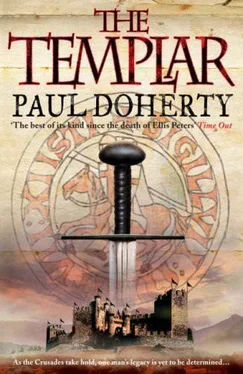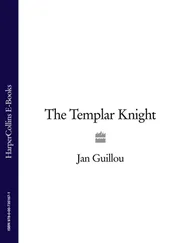P. Doherty - The Templar
Здесь есть возможность читать онлайн «P. Doherty - The Templar» весь текст электронной книги совершенно бесплатно (целиком полную версию без сокращений). В некоторых случаях можно слушать аудио, скачать через торрент в формате fb2 и присутствует краткое содержание. Год выпуска: 2010, ISBN: 2010, Издательство: Minotaur Books, Жанр: Исторические приключения, на английском языке. Описание произведения, (предисловие) а так же отзывы посетителей доступны на портале библиотеки ЛибКат.
- Название:The Templar
- Автор:
- Издательство:Minotaur Books
- Жанр:
- Год:2010
- ISBN:9780312576837
- Рейтинг книги:5 / 5. Голосов: 1
-
Избранное:Добавить в избранное
- Отзывы:
-
Ваша оценка:
- 100
- 1
- 2
- 3
- 4
- 5
The Templar: краткое содержание, описание и аннотация
Предлагаем к чтению аннотацию, описание, краткое содержание или предисловие (зависит от того, что написал сам автор книги «The Templar»). Если вы не нашли необходимую информацию о книге — напишите в комментариях, мы постараемся отыскать её.
The Templar — читать онлайн бесплатно полную книгу (весь текст) целиком
Ниже представлен текст книги, разбитый по страницам. Система сохранения места последней прочитанной страницы, позволяет с удобством читать онлайн бесплатно книгу «The Templar», без необходимости каждый раз заново искать на чём Вы остановились. Поставьте закладку, и сможете в любой момент перейти на страницу, на которой закончили чтение.
Интервал:
Закладка:
By evening they reached a crossroads near the yawning mouths of two lonely valleys, apparently empty except for the boulders, rocks, shrubs and trees dotting their sides. In between the valley mouths stretched a large, reed-ringed marsh. Bohemond, alarmed by increased sightings of Turkish patrols as well as rumours that the valleys on either side might house more, used the marsh to protect the rear of his camp. Nothing happened that night; it passed quiet and peaceful under the stars. At sunrise the priests gathered the people around the altar carts. Candles glowed in lantern horns and incense circled up into the heavy morning mist as Tancred led a comitatus of knights to scour the valley to the east.
As Mass finished, Tancred came hastening back with alarming news: Turkish horsemen were emerging out of the mist further down the valley. The Franks, still jubilant over what they considered their victory at Nicea and lulled by the calm morning, became excited and curious. Horsemen galloped off to catch sight of the enemy. Women and children mingled with the leaders at the front of the column; eventually these were forced back, becoming an unruly mob. Eleanor glimpsed Bohemond in full chain mail, a towering figure on his powerful black war charger. Riders, casting up clouds of dust, came galloping towards him, turning in the saddle and gesturing back. Eleanor recognised Hugh, Godefroi and Theodore. What they announced must have been truly alarming. Bohemond turned to face the people, ordering them to move back. Hugh, Godefroi and the rest forced their way through, jumping from their saddles, screaming for their harness and weapons.
‘Eleanor, Eleanor!’ Theodore pushed her back towards the tent. He snatched up a wet rag from just inside and wiped the dust from his face. ‘Arm yourselves,’ he gasped. ‘They aren’t Turkish patrols. Kilij Arslan’s entire army is coming out of that valley, thousands and thousands of horsemen. They’ll sweep us away!’ He gestured at Imogene, who stood horror-struck. ‘Arm!’ he yelled, then he snatched at the reins of his horse and clambered into the saddle. ‘Lord Bohemond is sending me back to hasten on the rest. Eleanor…’ He meant to say more, but shrugged, turned his horse and galloped off.
Terror and panic swept the camp as more scouts rode in. The Turkish battle lines were fast approaching. Bohemond forced his way through the gathering troops, imposing order. Carts were pulled into position. Oxen and donkeys were swiftly unhitched, their pack saddles and baggage used to defend gaps. Bohemond ordered all horsemen to the front. The rear of the camp would be protected by the marsh whilst a semicircle of foot and archers would guard its flanks. Battle instructions were shouted, armour and harness quickly donned and clasped, swords and daggers loosened in their sheaths. The anxiety spread, apprehension deepened. Men knelt praying, sobbing for help.
‘Here they come!’ shouted a voice.
Eleanor, standing on a cart, watched the haze swirl out of the mouth of the valley. It ebbed and flowed to reveal flashes of colour and the glitter of armour. A rumbling thunder shook the earth. The cloud of dust billowed then broke. Eleanor caught her breath at the power of the enemy. Hordes of horsemen armed with round shields, their bows already strung, arrows notched. They came on in a thunder of hooves, a pounding of drums and a clash of cymbals. They broke into a trot, a dense throng hurling itself towards the now silent Frankish lines. Screams pierced the air. Green banners flowed and rippled in the morning breeze. The Franks, standards now unfurled, answered with their own battle cries then, like lurchers in a hunt, burst into a furious, galloping charge. They should have smashed into the enemy like a battering ram, but the Turks divided abruptly to the left and right. As they did so, their mounted archers loosed shaft after shaft at the Frankish lines before closing in on the flanks with axe and scimitar, grappling hooks being thrown to drag the mailed knights from the saddle. Steel, flint and rock bit into head and stomach, smashing blows that severed hands, arms and legs. A second phalanx of Frankish knights prepared to charge but the Turkish horse, light and swift, came round the embattled first line and raced past the waiting ranks, loosing a deadly hail of arrows. Horses collapsed; others were panicked into galloping, only to be surrounded by Turks who closed to bring both horse and rider crashing to the ground. Bohemond could take no further provocation. The battle standards of Normandy unfurled, the air ringing with his war cry, his knights broke into a full charge against their tormentors.
Eleanor, drenched in a sweaty dust, the strengthening sun beating down on her, could see the Turkish tactics of attack and faked withdrawal. More enemy forces appeared. Eleanor glanced around. The camp was in chaos. Men, women and children now realised that if Bohemond’s men broke, the Turks would sweep through and massacre them. The air became a hellish din of horns, drums, cymbals and trumpets, all mingling with the shrieks, yells and crash of battle. Vultures appeared in the blue skies, forbidding black shadows hovering over that place of blood. The wounded were being dragged back to receive the attention of leeches or shaven-pated priests. One knight, bruised and battered, came clutching his side and collapsed by the cart. Eleanor, startled out of her shock, jumped down and ripped off his mail hauberk and jerkin. Beneath these, his shirt was sticky with blood. She went to staunch the wound, blackish red with the flies already hovering close.
‘No, leave me to a leech,’ the man gasped. He grasped Eleanor’s arm and gestured to the front. ‘They need water.’
Eleanor called to a leech kneeling beside another man, his limbs jerking, the death rattle noisy in his throat. The leech shrugged, pushed a wine-soaked rag into the dying soldier’s mouth and hurried across. Eleanor rose, calling Imogene and a cluster of women and children to bring waterskins, jugs, anything that would hold water. Some of the priests were already organising this as well as putting on white vestments and hurrying to the battle line to offer absolution and the Eucharist. Eleanor reached the rear rank of horsemen, a host of stinking, wounded knights, blood seeping through their chain mail, faces masked red. They sheltered and rested against the corpses of their horses, the bellies of which were already swelling. Some knights seemed to have swam in blood, swords red to the hilt, maces and axes smeared with gore. Angry eyes, glazed with the fury of battle, glared at her. She offered water, which was snatched and drunk greedily. Flies buzzed in dark clouds. Ahead of her echoed the raucous noise of battle. Bohemond had changed his tactics. The army was losing too many horses, so the Franks now stood in a curving arc of steel against the Turks, who attacked them then swiftly sheered off as they delivered shower after shower of barbed arrows. Men cursed and prayed as they rose to rejoin the battle. A few joked how, when they seized the Turkish camp, they’d bathe in water gushing from crystals, wear garlands of flowery spiken mixed with roses and sprinkle cinnamon in their hair. Others stayed nursing hideous wounds, cuts, slashes and bruises.
Eleanor glimpsed Hugh sitting exhausted on his horse, Godefroi beside him. She called their names but the ground shook with the thunder of a fresh charge and the ear-piercing whistle of the Turkish war cry. Arrows whipped through the air; a horse whinnied in agony. Men screamed for respite. Eleanor wanted to reach Hugh, but a heart-chilling shout sent her racing back to the camp. She stopped by a cart and stared in disbelief. A troop of Turkish horse had found its way across the marsh and was racing into the far side of the camp. Here and there men-at-arms and archers tried to hold them back, but the Turks spread out like angry hornets, shooting arrows before drawing their curved swords to cut to the left and the right. Women, children and priests were slashed and hacked. The Turks were dismounting in groups of twos and threes, seizing fleeing women, stripping them and throwing them down on to the ground. Eleanor felt as if she was carved from stone, with no life in her legs. She felt imprisoned by what she saw, as if asleep, suffering a nightmare that had to be endured. A line of foot was forming to protect the rest of the camp, but beyond these sprouted scenes from hell. A priest, still in his vestments, was fleeing for his life only to have his head sliced open with one swift cut. A monk was staggering backwards, facing the pursuing horseman, who paused, then leaned slightly to one side so his sword neatly severed the monk’s head. A soldier stood trying to free a shaft embedded deep in his chest. A Turk was getting up from raping a woman even as the knife in his right hand gashed her from groin to neck. Others were pillaging a tent, running out with jugs and basins and what looked like severed heads.
Читать дальшеИнтервал:
Закладка:
Похожие книги на «The Templar»
Представляем Вашему вниманию похожие книги на «The Templar» списком для выбора. Мы отобрали схожую по названию и смыслу литературу в надежде предоставить читателям больше вариантов отыскать новые, интересные, ещё непрочитанные произведения.
Обсуждение, отзывы о книге «The Templar» и просто собственные мнения читателей. Оставьте ваши комментарии, напишите, что Вы думаете о произведении, его смысле или главных героях. Укажите что конкретно понравилось, а что нет, и почему Вы так считаете.












